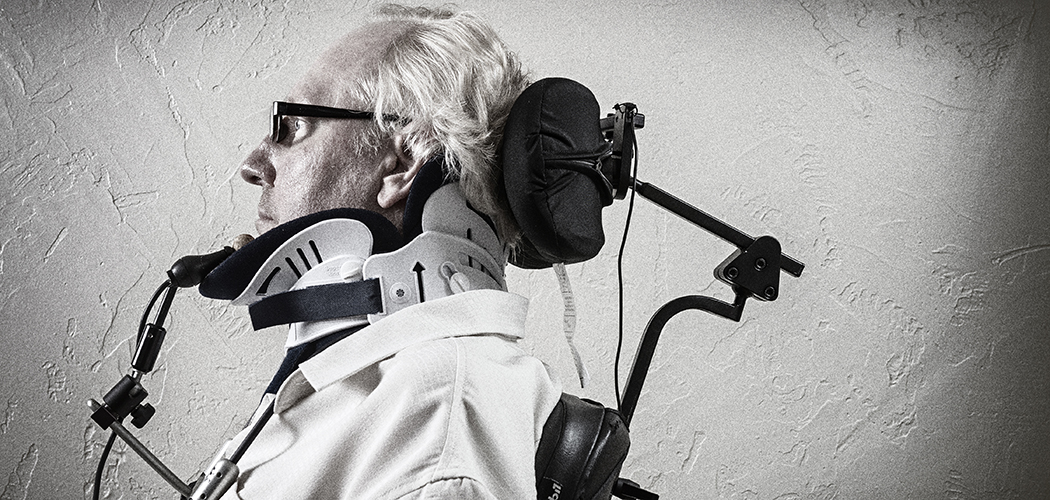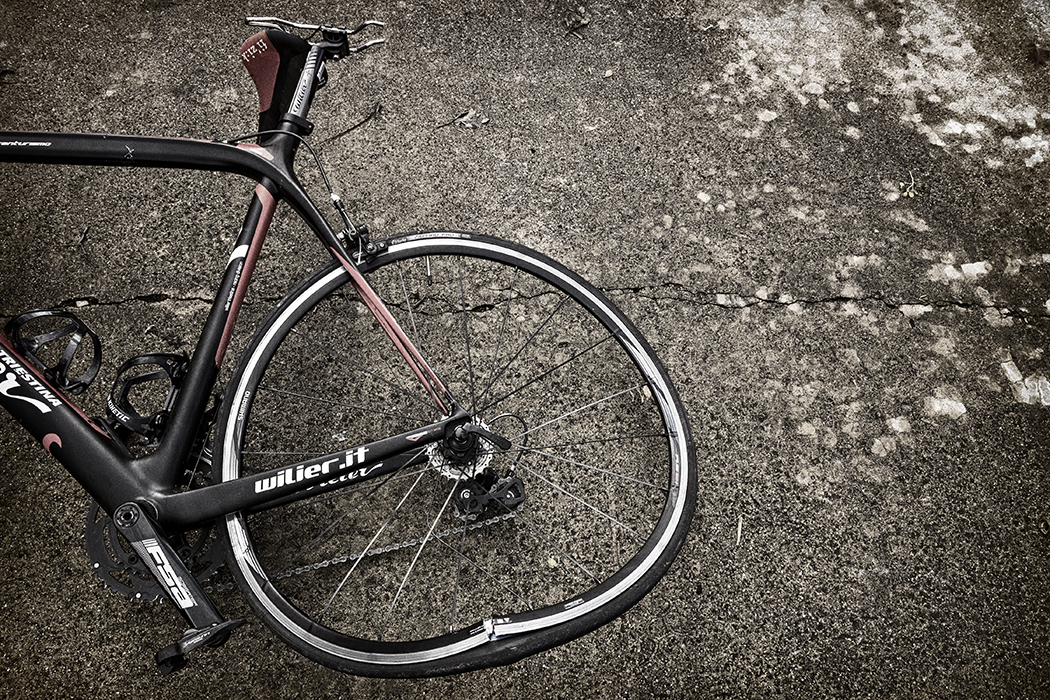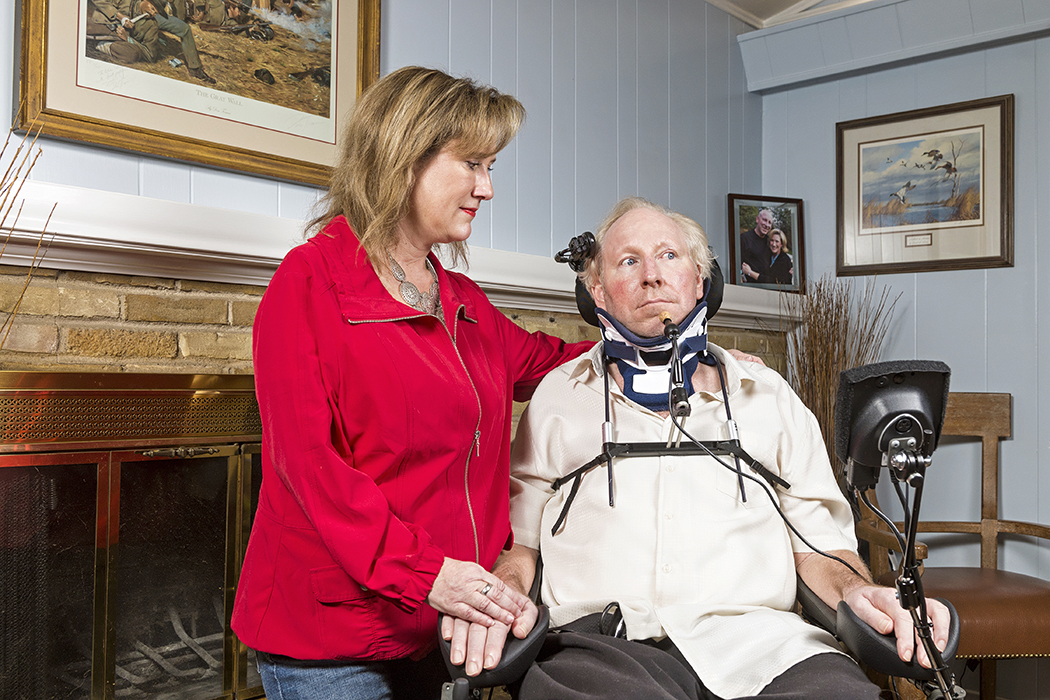50-plus mile bike ride from his Lake Highlands area home to White Rock Lake to Sunnyvale and back constituted a typical Saturday morning for Jim Heitzenreder.
“It’s like an old guys’ game of pick-up basketball,” he says of rolling lakeside on weekends, where he always finds a little friendly competition among fellow cyclists.
As he pedalled away on Nov. 5, his wife Alison Heitzenreder stood in the doorway, watching until he was out of sight.
“That wasn’t something I normally did. Call it women’s intuition,” she says. “I felt something was wrong.”
She shook it off and kept her haircut appointment. At the salon, though, she found herself obsessively checking Strava, a smartphone application that tracks runners’ and cyclists’ miles. For someone whose 50-year-old husband puts in 10,000 miles per year on Dallas’ oft-treacherous roads, it’s also, usually, a good way to offset apprehension.
Jim met his buddy James Aston at the 7-11 on Garland Road and they headed south. When they turned toward home it was almost 10 a.m.
They chatted as they rode, “About everything and nothing,” Jim says. There likely was some political talk, the presidential election was two days away, but he doesn’t remember specifics.
They were traveling the I-30 service road, approaching Loop 12 when Jim heard the cacophony of crunching metal at his back. All in a flash, he looked down at his speedometer, pushed his pace and thought only of outkicking whatever horrible situation was hurtling his way.
That is Jim’s last recollection of the day that changed his life.
There was no escaping the out-of-control vehicle that propelled into his path.
Aston, thrown from his bike, incurred a concussion, bruises and lacerations.
Jim took the brunt of the collision; an initial police report shows it resulted when 18-year-old Lester Flores, weaving in and out of traffic at about 80 miles per hour, hit another car.
The second vehicle, when it struck Jim, severed his spinal cord and dislocated multiple vertebrae.
Flores at time of publication is in Dallas County Jail facing charges for “aggravated assault causing serious bodily injury.”
Checking her phone again, Alison watched her husband’s route deviate from the norm. Strava suddenly showed “a b-line toward Downtown Dallas,” she says. “I didn’t immediately put him at Baylor Hospital, but I knew something had happened. I started texting and calling.”
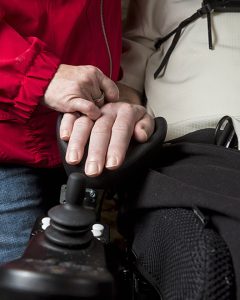
Alison and Jim Heitzenreder are a team when it comes to facing “the new normal,” which includes wheelchairs
and a part-time caretaker. Photo by Danny Fulgencio
When the call from Jim’s phone came, a hospital worker told her in vague terms about the accident.
“I could hear the clank of machines and things in the background, and then Jim’s voice: ‘I am OK, baby.’”
In a recreation room on the third floor of Baylor Rehab Institute in early January, Jim, sitting in a motorized wheelchair that he controls with his chin, says he doesn’t remember saying that, though he’s not surprised he did.
“That is my packaged line,” he says.
He smiles, his eyes twinkle, his shoulders shrug for emphasis. No evidence remains of the bumps, cuts and bruises that covered his face in November. A nurse teases him about running over her toes; he challenges her to a race.
It’s enough to momentarily distract from the neck brace, sternly holding him face-forward, and his inability to move any other part of his body.
His first memory following the crash was waking up Nov. 7, seeing election results pouring in on the news and thinking, “I didn’t vote.”
He recalls relief in ICU when doctors removed a breathing tube. “It was like an alien invading your body — I was like Sigourney Weaver,” he says.
It meant he could talk again — not being able to do so had been frustrating.
Alison, perpetually by his side, walks with a slight limp. She explains that a childhood stroke partially paralyzed her right side.
“We’re down to about 25 percent of us combined that works now,” Jim says as they smile at one another.
For Alison, panic was followed by an unexpected peace, she says, “Something kicked in. The Lord scooped me up and carried me.”
Within several hours, Jim underwent an operation to fuse his third and fourth vertebrae. A few days after that, surgeons reconstructed his shattered fifth vertebrae. When the doctor broke the news that he was going to be quadriplegic, Alison rejoiced.
“Because it meant he was going to live,” she explains.
Jim agrees. “I had a couple semi-pity parties, but I was really thankful I still had a fully functioning brain, that I was alive, that she had never let me go without a helmet.”
Supportive family, neighbors and friends from their Highland Park Presbyterian Church surrounded the couple at the hospital.
“I remember thinking how sweet it was having so many people praying for us,” Alison says.
In addition to moral support, friends, neighbors and strangers alike have united to help fund Jim’s medical expenses beyond what insurance will cover. Many have contributed through REACT, a spinal cord injury recovery 501(c)3. Tax-deductible donations are accepted via PayPal at neuroreaction.org. The Oddfellows took up a collection at a Christmas party and wrote Alison a check. A fellow Sunday school student helped Alison prepare the house for the day Jim would come home, a massive undertaking.
Jim says that he has seen the very best come out in his friends and neighbors during this time. “It is a great example of communities coming together just to help someone get through something.”
In their strength and optimism, the Heitzenreders in turn have inspired others.
Dallasite Bill Dunham had never met Jim, but visited on behalf of a mutual friend who could not travel. He says his “chance encounter” with the couple “stunned and motivated” him in various ways.
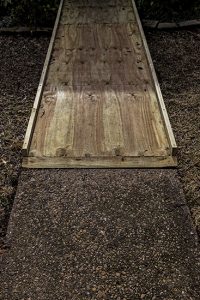
The Heitzenreder home has been modified to accommodate Jim’s condition: changes include a ramp, wider doors and a new bathroom. Photo by Danny Fulgencio
“I was struck by Jim’s positive attitude, resiliency and his strong faith,” Dunham notes. “He didn’t show any signs of depression or bitterness towards the driver who hit him. I am so impressed and inspired by his determination, which he’ll need as he transitions to his new reality at home.”
Baylor released him in mid-January, and the couple was ecstatic to go home to a newly remodeled house.
A new ramp provides Jim access to his front door. Four interior doorways have been widened to accommodate the wheelchair. The bathroom is redone, from the studs up, to make way for a specially designed tub and shower.
“And we had to get a van,” Alison says. A good thing, because before heading home, Jim wanted to collect his bicycle from the police station.
“We’ve had 10s of thousands of good miles together,” he says. “It’s a beautiful bike, a good girl, we went down hard together.”
He isn’t sure how he might replace his passion for cycling, he says. Along with everything else, that is a day-by-day discovery process. “Looking too far into the future would be overwhelming. The reality is, wallowing would be useless.”
If anything can be derived from his situation, he hopes it involves drivers thinking a little more about cyclists’ rights and safety, he says. Jim says and he doesn’t hold a grudge against the young driver, who is facing serious charges, though he does make a couple jokes about condemning the guy to be his caretaker for a period of time. Alison says she’s too busy to give the kid a second thought.
There are things the Heitzenreders could use (a $20,000 therapeutic cycle, for example, that would allow Jim to exercise his muscles) and things they hope (maybe he will use his arms again someday — every spinal cord injury is different, they point out, so you never know). But overwhelmingly they feel “wonderful,” Alison says.
A Godsend caregiver comes every morning, and, though it isn’t easy, Alison learned after three days how to get Jim to bed on her own, so they have time together alone.After spending months having people in and out of the room day and night, that is a blessing, she adds.
“He still has the biggest smile,” she says of Jim. “And he keeps me happy, as we are getting to normal, the new normal.”

